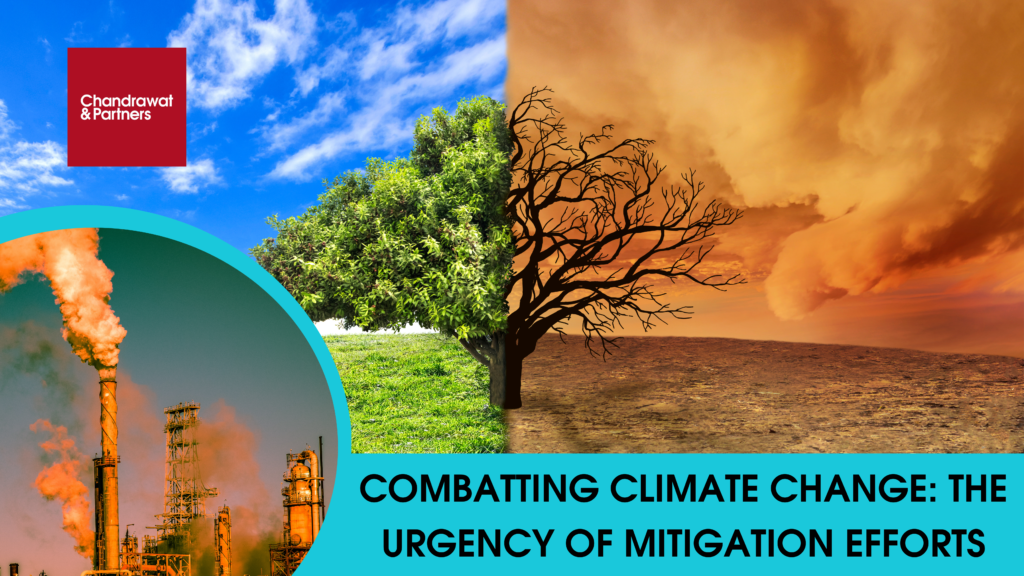Share :
Combatting Climate Change: The Urgency of Mitigation Efforts
Climate change presents an existential threat that requires a global response. Mitigation strategies, which aim to reduce greenhouse gas (GHG) emissions and enhance carbon sequestration, are crucial in addressing this crisis.
UNDERSTANDING MITIGATION STRATEGIES
- Emission Reduction:This core strategy focuses on decarbonizing the global economy. Key areas include:
- Energy Sector Transformation:Transitioning from fossil fuels to renewable energy sourceslike solar, wind, geothermal, and hydropower.
- Energy Efficiency:Implementing measures to optimize energy consumption in buildings, industries, and transportation.
- Sustainable Land Management:Combating deforestation and promoting practices like afforestation and improved forest management to increase carbon sinks.
- Carbon Capture and Storage (CCS):Capturing CO2 emissions from industrial processes and storing them underground in geological formations.
INTERNATIONAL AGREEMENTS FOR COLLECTIVE ACTIONS
- The Paris Agreement:
A landmark accord adopted in 2015 by nearly all of the world’s nations, it aims to limit global warming to well below 2°C, preferably to 1.5°C, compared to pre-industrial levels. Achieving this ambitious goal requires a rapid and transformative reduction in greenhouse gas (GHG) emissions by all countries. The Agreement operates on a system of Nationally Determined Contributions (NDCs), where each country outlines its planned emission reduction targets and actions.
Additionally, the Agreement includes provisions for financial assistance from developed countries to support developing countries in their mitigation and adaptation efforts, as well as for technology transfer to facilitate the adoption of clean technologies.
- The Kyoto Protocol: The predecessor to the Paris Agreement, adopted in 1997 and entering into force in 2005, set binding emission reduction targets for developed nations. The Kyoto Protocol played a crucial role in raising awareness about climate change and initiating international cooperation on mitigation efforts. However, its effectiveness was limited by the withdrawal of the United States and the lack of participation from major developing countries.
- The Montreal Protocol: While not directly targeting CO2, this international treaty adopted in 1987 has significantly reduced emissions of hydrofluorocarbons (“HFCs”) and potent greenhouse gases used in refrigeration and air conditioning. The Montreal Protocol is a successful example of international cooperation in addressing environmental challenges, and its phase-down of HFCs has provided a significant benefit for climate change mitigation.
Enhancing Sustainability: Additional Strategies
1. Sustainable Consumption and Production: Encouraging a circular economy that emphasize resource efficiency and waste reduction.
2. Climate-Smart Agriculture: Implementing practices to reduce agricultural emissions, including methane and nitrous oxide, while enhancing soil carbon sequestration.
ADDRESSING THE CHALLENGE
Mitigating climate change requires a comprehensive approach. International collaboration, exemplified by agreements like the Paris Accord, is essential. Furthermore, investing in advanced technologies and promoting innovation are imperative for fostering sustainable development. Additionally, individual decisions regarding consumption habits and responsible resource utilization play a significant role in addressing the issue.
FURTHER CONSIDERATION
- Equity and Just Transition:
Developed nations have a responsibility to support developing countries in their transition to clean energy and to address the social impacts of decarbonization. - Climate Finance:Mobilizing significant financial resources from public and private sectors is crucial for implementing mitigation strategies.
The Path Forward:
The urgency of mitigating climate change necessitates immediate and sustained action from all stakeholders. Implementing a comprehensive strategy that integrates ambitious policy frameworks, technological innovation, and a commitment to a just transition can lead us towards a sustainable future and help to prevent the catastrophic consequences of climate change.
How we can help?
We specialise in advising clients across various sectors on ESG risk and compliance measures. We offer in-depth expertise in sustainable performance laws, regulations, and standards, assisting businesses in managing risks effectively and enhancing their competitiveness. With decades of collective experience in environmental, social, and governance matters, our professionals stay updated on the latest developments globally.
Our team provides efficient advice in areas such as environmental practices, sustainable finance, government relations, business and human rights, corporate governance, and employee engagement. This approach addresses a wide spectrum of ESG risk factors and opportunities.
For more information or queries, please email us at
enquiries@chandrawatpartners.com




